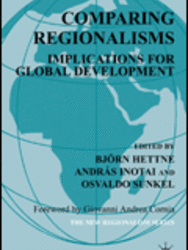Book
Comparing Regionalisms
Implications for Global Development
Comparing Regionalisms summarizes the UNU/WIDER international research project on the formation of world regions, and what implications this process will have for the future world order, particularly as far as the important issues of peace and development are concerned. This last volume in a series of five focuses on comparative research, covering all important regions of the world. Comparative studies are seen as the next step in regional analysis. Acknowledging the enormous variety of regional formations, the contributors nevertheless argue that a comparative approach to the dynamics of regionalization will provide important knowledge not only about the regions in question, but also about the emerging world order.
 Join the network
Join the network